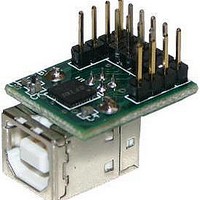MM232R FTDI, MM232R Datasheet - Page 15

MM232R
Manufacturer Part Number
MM232R
Description
Interface Modules & Development Tools USB to Serial UART Mini Dev Mod FT232R
Manufacturer
FTDI
Type
Development Moduler
Specifications of MM232R
Interface Type
USB, Serial, UART
Data Bus Width
Serial
Operating Supply Voltage
1.8 V to 5.25 V
Product
Interface Modules
Supported Devices
FT232RQ
Svhc
No SVHC (18-Jun-2010)
Development Tool Type
Development Kit
Kit Features
Single Chip USB To Asynchronous Serial Data Transfer Interface, Entire USB Protocol Handled
Rohs Compliant
Yes
Supported Families
FT232RQ
Tool / Board Applications
USB To Serial UART Converter
For Use With/related Products
FT232R
Lead Free Status / RoHS Status
Lead free / RoHS Compliant
Other names
626-DLP-MM232R
6.2 Self Powered Configuration
Figure 6.2 Self-Powered Configuration
Figure 7.2 illustrates the MM232R in a typical USB self powered configuration. In this case the link on
jumper J2 is removed, and an external supply is connected to the module VCC pins. Figure 7.2 illustrates a
self powered design which has a 3.5V – 5V supply.
A USB Self Powered device gets its power from its own power supply and does not draw current from the
USB bus. The basic rules for USB Self powered devices are as follows:
In order to meet requirement (i) the USB Power is used to control the RESET# Pin of the FT232R device.
When the USB Host or Hub is powered up the internal 1.5kΩ resistor on USBDP is pulled up to 3.3V, thus
identifying the devices as a full speed device to USB. When the USB Host or Hub Power is off, RESET# will
go low and the device will be held in reset. As RESET# is low, the internal 1.5kΩ resistor will not be pulled
up to 3.3V, so no current will be forced down USBDP via the 1.5kΩ pull-up resistor when the host or hub is
powered down. To do this pin 15 (USBPWR) is connected to 4K7 resistor and Reset# is connected between
4K7 and 10K. Failure to do this may cause some USB host or hub controllers to power up erratically.
Note: When the FT232Ris in reset, the UART interface pins all go tri-state. These pins have internal 200kΩ
pull-up resistors to VCCIO, so they will gently pull high unless driven by some external logic. Figure 7.2 is
also an example of interfacing the FT232R to a Microcontroller (MCU) UART interface. This example uses
TXD and RXD for transmission and reception of data and RTS# / CTS# hardware handshaking.
Optionally, RI# can be connected to another I/O pin on the MCU and could be used to wake up the USB
host controller from suspend mode. One of the CBUS pins could be configured as a 6/12/24/48 MHz clock
output which can be used to clock the MCU. If the MCU is handling power management functions, then a
CBUS pin can be configured as PWREN# and should also be connected to an I/O pin of the MCU.
© Copyright 2010 Future Technology Devices International Ltd
iii) A Self Powered Device can be used with any USB Host and both Bus and Self Powered USB Hub. In
ii) A Self Powered Device can use as much current as it likes during normal operation and USB suspend
i) A Self Powered device should not force current down the USB bus when the USB Host or Hub
Controller us powered down.
as it has its own power supply.
this case the power descriptor in the internal EEPROM should be programmed to a value of zero (self
powered).
MM232R USB - Serial UART Development Module Incorporating Clock Generator
Document Reference No.: FT_000214
Clearance No.: FTDI# 132
Datasheet Version 1.1
14
















